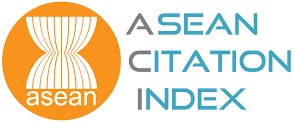Tensile strength of woven yarn kenaf fiber reinforced polyester composites
DOI:
https://doi.org/10.15282/jmes.9.2015.15.0163Keywords:
Kenaf yarn; tensile strength; natural fiber composites; woven kenaf fibers.Abstract
This paper presents the tensile strength of woven kenaf fiber reinforced polyester composites. The as-received yarn kenaf fiber is weaved and then aligned into specific fiber orientations before it is hardened with polyester resin. The composite plates are shaped according to the standard geometry and uni-axially loaded in order to investigate the tensile responses. Two important parameters are studied such as fiber orientations and number of layers. According to the results, it is shown that fiber orientations greatly affected the ultimate tensile strength but it is not for modulus of elasticity for both types of layers. It is estimated that the reductions of both ultimate tensile strength and Young’s modulus are in the range of 27.7-30.9% and 2.4-3.7% respectively, if the inclined fibers are used with respect to the principal axis.
References
Akil HM, Omar MF, Mazuki AAM, Safiee S, Ishak ZAM, Abu Bakar A. Kenaf fiber reinforced composites: A review. Materials & Design. 2011;32:4107-21.
Zampaloni M, Pourboghrat F, Yankovich SA, Rodgers BN, Moore J, Drzal LT, et al. Kenaf natural fiber reinforced polypropylene composites: A discussion on manufacturing problems and solutions. Composites Part A: Applied Science and Manufacturing. 2007;38:1569-80.
Ismail AE, Hassan M. Low velocity impact on woven kenaf fiber reinforced composites. Applied Mechanics and Materials. 2014. p. 503-6.
Roslan MN, Ismail AE, Hashim MY, Zainulabidin MH, Khalid SNA. Modelling analysis on mechanical damage of kenaf reinforced composite plates under oblique impact loadings. Applied Mechanics and Materials. 2014. p. 1324-8.
Umar AH, Zainudin ES, Sapuan SM. Effect of Accelerated weathering on tensile properties of kenaf reinforced high-density polyethylene composites. Journal of Mechanical Engineering and Sciences. 2012;2:198-205.
Huzni S, Ilfan M, Sulaiman T, Fonna S, Ridha M, Arifin AK. Finite element modeling of delamination process on composite laminate using cohesive elements. International Journal of Automotive and Mechanical Engineering. 2013;7:1023-30.
Azrin Hani AR, Shaari MF, Mohd Radzuan NS, Hashim MS, Ahmad R, Mariatti
M. Analysis of woven natural fiber fabrics prepared using self-designed handloom. International Journal of Automotive and Mechanical Engineering. 2013;8:1197-206.
Aji I, Sapuan S, Zainudin E, Abdan K. Kenaf fibres as reinforcement for polymeric composites: a review. International Journal of Mechanical and Materials Engineering. 2009;4:239-48.
Ochi S. Mechanical properties of kenaf fibers and kenaf/PLA composites. Mechanics of Materials. 2008;40:446-52.
Anuar H, Zuraida A. Improvement in mechanical properties of reinforced thermoplastic elastomer composite with kenaf bast fibre. Composites Part B: Engineering. 2011;42:462-5.
Sapuan SM, Leenie A, Harimi M, Beng YK. Mechanical properties of woven banana fibre reinforced epoxy composites. Materials & Design. 2006;27:689-93.
Shan CW, Ghazali MI, Idris MI. Improved vibration characteristics of flexible polyurethane foam via composite formation. International Journal of Automotive and Mechanical Engineering. 2013;7:1031-42.
Mohamad N, Nur Sharafina Z, Ab Maulod HE, Yuhazri MY, Jeefferie AR. Morphological and mechanical properties of polypropylene/epoxidized natural rubber thermoplastic vulcanizates treated with maleic anhydride-grafted polypropylene. International Journal of Automotive and Mechanical Engineering. 2013;8:1305-15.
Wambua P, Ivens J, Verpoest I. Natural fibres: can they replace glass in fibre reinforced plastics? Composites Science and Technology. 2003;63:1259-64.
Taufik RS, Adibah M NF, Muhamad MR, Hasib H. Feasibility Study of natural fiber composite material for engineering application. Journal of Mechanical Engineering and Sciences. 2014;6:940-8.
Ibrahim MS, Sapuan SM, Faieza AA. Mechanical and thermal properties of composites from unsaturated polyester filled with oil palm ash. Journal of Mechanical Engineering and Sciences. 2012;2:133-47.
Khan GMA, Terano M, Gafur MA, Alam MS. Studies on the mechanical properties of woven jute fabric reinforced poly(l-lactic acid) composites. Journal of King Saud University - Engineering Sciences. 2016;28:69-74.
Ismail AE, Ariffin AK, Abdullah S, Ghazali MJ. Off-set crack propagation analysis under mixed mode loadings. International Journal of Automotive Technology. 2011;12:225-32.
Ismail AE, Ariffin AK, Abdullah S, Ghazali MJ. Stress intensity factors for surface cracks in round bar under single and combined loadings. Meccanica. 2012;47:1141-56.
Ismail AE, Zainulabidin M, Roslan MN, Mohd Tobi A, Nor M, Hisyamudin N. Effect of velocity on the impact resistance of woven jute fiber reinforced composites. Applied Mechanics and Materials. 2014. p. 1277-81.
Downloads
Published
Issue
Section
License
Copyright (c) 2015 The Author(s)

This work is licensed under a Creative Commons Attribution 4.0 International License.





